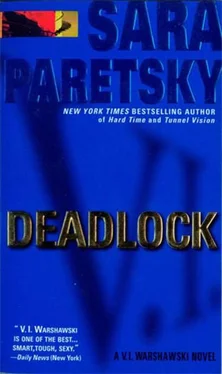I poured myself more coffee and thought about what I should do. First on the list was Mattingly. I called Pierre Bouchard and asked him where I could find Mattingly if he were in town but not at home.
He clicked his tongue against his teeth. “That I could not tell you, Vic. I have avoided the man constantly. But I will call around and see what I can find out.”
I told him Elsie was due any day now and he clicked his tongue again. “That man! What an excrescence he is!”
“By the way, Pierre, does Howard know how to do deep-sea diving?”
“Deep-sea diving?” he echoed. “No, Vic, I am telling you, I do not know him well. I do not know his personal habits. But I will ask… Oh, don’t hang up-I have that name for you.”
“What name?”
“Did you not call Anna before you left town? You wanted to know what man we met at Christmas, when Boom Boom met Paige Carrington?”
“Oh yes.” I’d forgotten all about that. The man who was interested in buying a few shares of the Black Hawks, the man for whom Odinflute had set up his party. “Yes. Who was it?”
“His name is Niels Grafalk. Myron says after all he decided not to buy.”
“I see,” I said weakly. I said nothing else and after a bit Bouchard said, “Vic? Vic? Are you still there?”
“What? Oh yes. Yes, thanks very much, Pierre… Let me know if you hear from Mattingly.”
Though distracted, I took my check over to Humboldt Olds where I bought an Omega, a 1981 red model with fifteen thousand miles on it, power steering and power brakes. I had to sign a finance contract for eight hundred dollars but that wouldn’t prove impossible. I’d just bill Boom Boom’s estate for a hefty fee when all this mess was cleaned up. If it ever was.
So Grafalk had been interested in the Black Hawks. And Paige had been present at that same party. Now whom had she known? Who took her? It was an interesting coincidence. I wondered what she would tell me if I called her.
Driving in a slight daze, I reached Boom Boom’s apartment at three-thirty, parking the Olds in front of a NO PARKING sign at Chestnut and Seneca. After two weeks of neglect, which had included a burglary and a police investigation, the place looked far worse than mine had this morning. Gray dust from the fingerprint detectors covered all the papers. White chalk still marked the outline of Henry Kelvin’s body next to the desk.
I poured myself a glass of Chivas. I was damned if I was going to clean up two places in one day. Instead, I made a stab at reassembling the papers in their appropriate categories. I’d hire a cleaning crew and some temporary clerks to do the rest of the work. Frankly, I was sick of the place.
I made a tour of the apartment to collect items of interest to me-Boom Boom’s first and last hockey sticks, a New Guinea hut totem from the living room, and some of the pictures of him in various hockey guises from the spare-room wall. Once more the picture of me in my maroon law school robes grinned incongruously from the wall. I took it off and added it to the stack under my arms. Once the clerks had gotten the papers to the right people and the cleaners had eliminated all the greasy dirt, I’d get the condo and the rest of his possessions onto the market. With any luck, I’d never have to visit this place again. I slung the items into my trunk and drove off. No one had ticketed me-maybe my luck was beginning to turn.
Next stop: the Eudora Grain offices. I badly wanted to talk to Bledsoe about why Mattingly had left Sault Ste. Marie in his airplane, but I still thought Phillips’s finances were an angle worth following up.
Late Saturday afternoon was an eerie time to visit the Port of Chicago. There wasn’t much activity at the elevators. The huge ships stood like sleeping giants, prepared to wake into violent activity if disturbed. I eased the Omega into the parking lot at Eudora’s Grain regional office and found myself tiptoeing across the blacktop to a side door.
A small bell was set into the wall with a little sign over it reading RING FOR DELIVERIES. I rang several times and waited five minutes. No one came. If there was a night watchman, he wasn’t yet on the premises. From my back pocket I pulled a house burglar’s compedium of commonly used picklocks and set out methodically to open the door.
Ten minutes later I was in Phillips’s office. Either he or the efficient Lois kept all the file cabinets locked. With an aggrieved sigh, I took out my picklocks again and opened all the cabinets in the room and the three in Lois’s desk outside his office door. I called Lotty and told her I wouldn’t be in for supper and set to work. If I’d been thinking, I would have brought some sandwiches and a thermos of coffee.
Phillips kept a strange collection of junk in his upper desk drawer-three different kinds of antacids; datebooks going back for six years, most of them without any appointments written in; nose drops; an old pair of overshoes; two broken calculators; and odd scraps of paper. These I carefully smoothed out and read. Most of them were phone messages which he’d crumpled up and tossed in the drawer. A couple from Grafalk, one from Argus. The others were all names I didn’t recognize, but I wrote them down in case I ran so far out of leads that I wanted to check them.
The ledgers were in a walnut filing cabinet on the window side of the office. I pulled them out with great alacrity. They were in the form of computer printouts, issued once a month with year-to-date totals and comparisons with prior years. After a certain amount of looking, I found report A36000059-G, payments to licensed carriers. All I needed now was my list of shipping contracts and I could compare the dates and see if the totals matched.
Or so I thought. I went out to Lois’s file cabinets and found the originals of the contracts Janet had photocopied for me. These I took back into Phillips’s office to lay next to report A36000059-G. Only then did I discover that the ledger recorded by invoice number, not by contract date. At first I thought I could just match totals of individual orders against totals in the ledger; I pulled the Pole Star Line’s as an example.
Unfortunately the carriers apparently submitted more than one job on an invoice. The invoice totals were so much greater than the individual transactions, and the number of total invoices paid so much smaller, that it seemed to me that was the only explanation.
I added and subtracted, matching the numbers up every way I could think of, but I was forced to conclude that I wasn’t going to be able to tell a thing without the individual invoices. And those I could not find. Not a one. I went through the rest of Phillips’s files and all through Lois’s and finally through the open file cabinets out on the floor. There wasn’t an invoice in the place.
Before giving up for the evening, I looked up the payroll section of the ledgers. Phillips’s salary was listed there just as Janet had told me. If I’d known I was going to burgle the place I would never have let her risk getting fired by going through his garbage.
I tapped my front teeth with a pencil. If he was getting extra money from Eudora Grain, it wasn’t through the payroll account. Anyway, the ledgers were printed by the computers in Eudora, Kansas-if he was monkeying around with the accounts, he’d have to do it more subtly.
I shrugged and looked at my watch. It was after nine o’clock. I was tired. I was very hungry. And my shoulder was throbbing. I’d earned a good dinner, a long bath, and a sound sleep, but there was still another errand on the day’s agenda.
Back in my apartment, I threw some frozen pasta into a pot with tomatoes and basil and ran a bath. I plugged the phone into the bathroom wall and called Phillips’s Lake Bluff house. He wasn’t in, but his son politely asked if he could take a message.
Читать дальше












